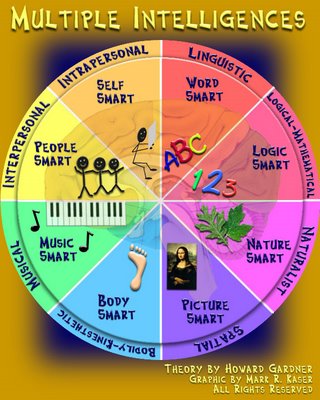GARDENER

'In my view, if we are to encompass adequately the realm of human cognition, it is necessary to include a far wider and more universal set of competences than has ordinarily been considered. And it is necessary to remain open to the possibility that many - if not most - of these competences do not lend themselves to measurement by standard verbal methods, which rely very heavily on a blend of logic and linguistic abilities'
Howard Gardner
GARDNER'S EIGHT CRITERIA
FOR IDENTIFYING AN INTELLIGENCE
IT'S NOT HOW SMART YOU ARE -
IT'S HOW YOU ARE SMART!
-Dr. Howard Gardner

Howard Gardner's Theory of Multiple Intelligences
What parent can not see gleaming rays of genius in their child? And yet, how many children come to school and demonstrate their own unique genius? There was a time when it might have been a joke to suggest "Every parent thinks their kid's a genius." But research on human intelligence is suggesting that the joke may be on educators! There is a constant flow of new information on how the human brain operates, how it differs in function between genders, how emotions impact on intellectual acuity, even on how genetics and environment each impact our childrens' cognitive abilities. While each area of study has its merits, Howard Gardner of Harvard University has identified different KINDS of intelligence we possess. This has particularly strong ramifications in the classroom, because if we can identify children's different strengths among these intelligences, we can accommodate different children more successfully according to their orientation to learning.
Thus far Gardner 's work suggests nine intelligences. He speculates that there may be many more yet to be identified. Time will tell. These are the paths to children's learning teachers can address in their classrooms right now. They are:
VISUAL/SPATIAL - learning visually and organizing ideas spatially. Seeing concepts in action in order to understand them. The ability to "see" things in one's mind in planning to create a product or solve a problem.
Action words for this intelligence-
Observe, symbolize, draw, sketch, draft, illustrate, paint, color, contour, outline, rearrange, design, redesign, invent, create, conceive, originate, innovate, imagine, picture, envision, visualize, pretend

VERBAL/LINGUISTIC - learning through the spoken and written word. This intelligence was always valued in the traditional classroom and in traditional assessments of intelligence and achievement.
Action words for this intelligence-
Read, write, speak, tell, ask, explain, inform, convey, report, articulate, address, confer, request, recount, lecture, present, announce, narrate, debate, discuss, converse, recite, quote, describe, clarify

MATHEMATICAL/LOGICAL - learning through reasoning and problem solving. Also highly valued in the traditional classroom, where students were asked to adapt to logically sequenced delivery of instruction.
Action words for this intelligence-
Solve, resolve, question, hypothesize, theorize, scrutinize, investigate, experiment, analyze, deduce, prove, verify, decipher, determine, predict, estimate, measure, calculate, quantify, simplify

BODILY/KINESTHETIC - learning through interaction with one's environment. This intelligence is not the domain of "overly active" learners. It promotes understanding through concrete experience.
Action words for this intelligence-
Build, construct, erect, assemble, make, manufacture, structure, craft, imitate, play, perform, walk, run, jump, dance, collect, gather, compile, fashion, shape, duplicate, dissect, exercise, move, transport

MUSICAL/RHYTHMIC - learning through patterns, rhythms and music. This includes not only auditory learning, but the identification of patterns through all the senses.
Action words for this intelligence-
Listen, hear, infer, audiate, note, pattern, sing, clap, chant, model, repeat, replicate, reproduce, copy, echo, imitate, impersonate, mimic, compose, harmonize, dub, rap, orchestrate, resonate

INTRAPERSONAL - learning through feelings, values and attitudes. This is a decidedly affective component of learning through which students place value on what they learn and take ownership for their learning.
Action words for this intelligence-
Express, imply, support, sponsor, promote, advise, advocate, encourage, champion, justify, rationalize, characterize, defend, validate, vindicate, assess, evaluate, judge, challenge, survey, poll

INTERPERSONAL - learning through interaction with others. Not the domain of children who are simply "talkative" or "overly social." This intelligence promotes collaboration and working cooperatively with others.
Action words for this intelligence-
Share, lead, guide, direct, help, mediate, manage, conduct, collaborate, cooperate, interview, influence, persuade, campaign, convince, compromise, role play, improvise, ad-lib, referee, reconcile
 a
aNATURALIST - learning through classification, categories and hierarchies. The naturalist intelligence picks up on subtle differences in meaning. It is not simply the study of nature; it can be used in all areas of study..
Action words for this intelligence-
Sort, organize, categorize, compare, contrast, differentiate, separate, classify, detail, align, order, arrange, sequence, inventory, catalogue, group, file, index, chronicle, log, map, chart, graph

EXISTENTIAL - learning by seeing the "big picture": "Why are we here?" "What is my role in the world?" "What is my place in my family, school and community?" This intelligence seeks connections to real world understandings and applications of new learning.
Action words for this intelligence-
Reflect, contemplate, deliberate, ponder, summarize, synthesize, associate, relate, recap, encapsulate, elaborate, appreciate, appraise, critique, evaluate, assess, speculate, explore, dream, wonder

Teachers are now working on assimilating this knowledge into their strategies for helping children learn. While it is too early to tell all the ramifications for this research, it is clear that the day is past where educators teach the text book and it is the dawn of educators teaching each child according to their orientation to the world.
"Receive the child in reverence, educate him in love and set him forth in freedom."
Rudolf Steiner
Remember,
* Everyone has ALL the intelligences
The intelligences are not mutually exclusive - they act in consort
MI Theory was not developed to exclude individuals, but to allow all
people to contribute to society through their own strengths



0 Comments:
Post a Comment
<< Home